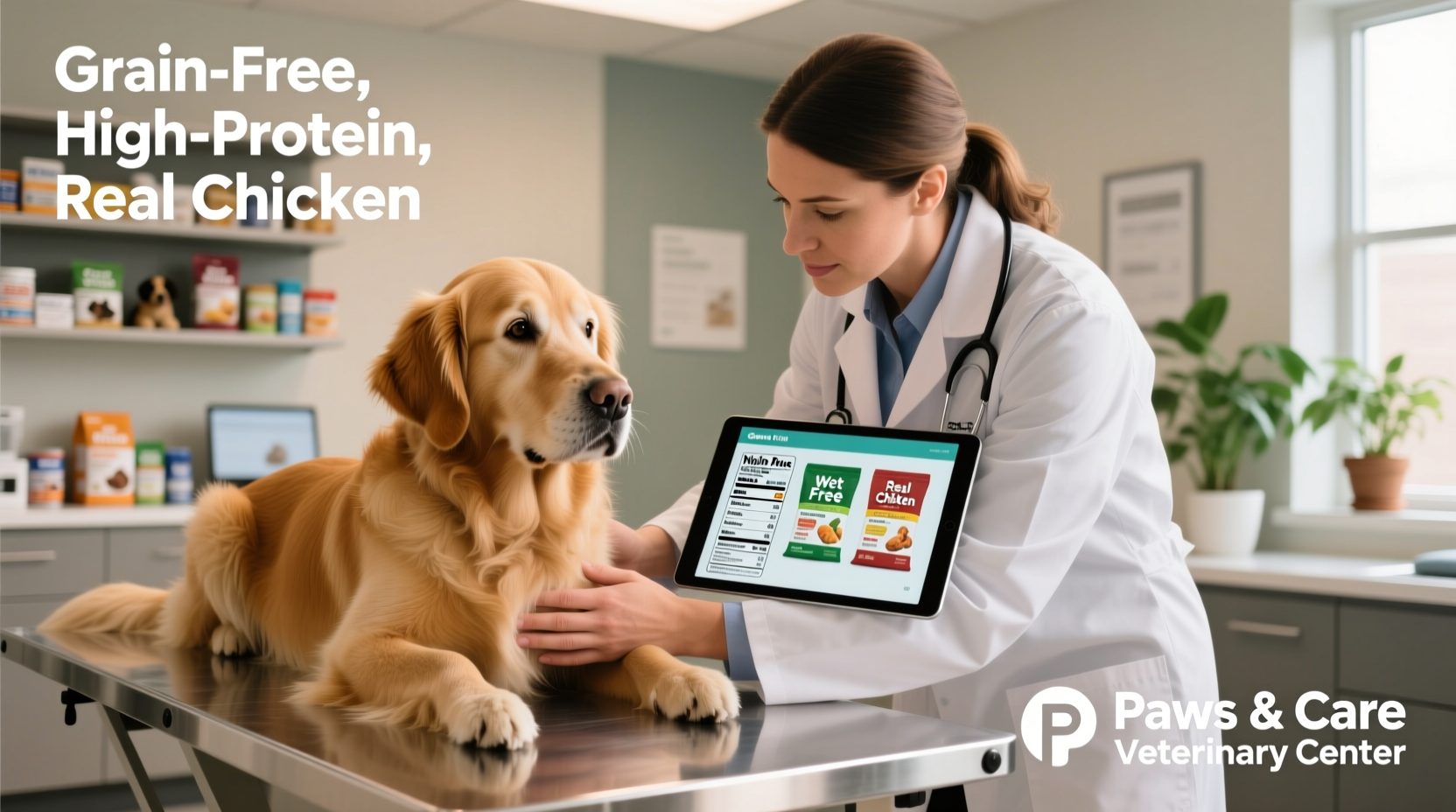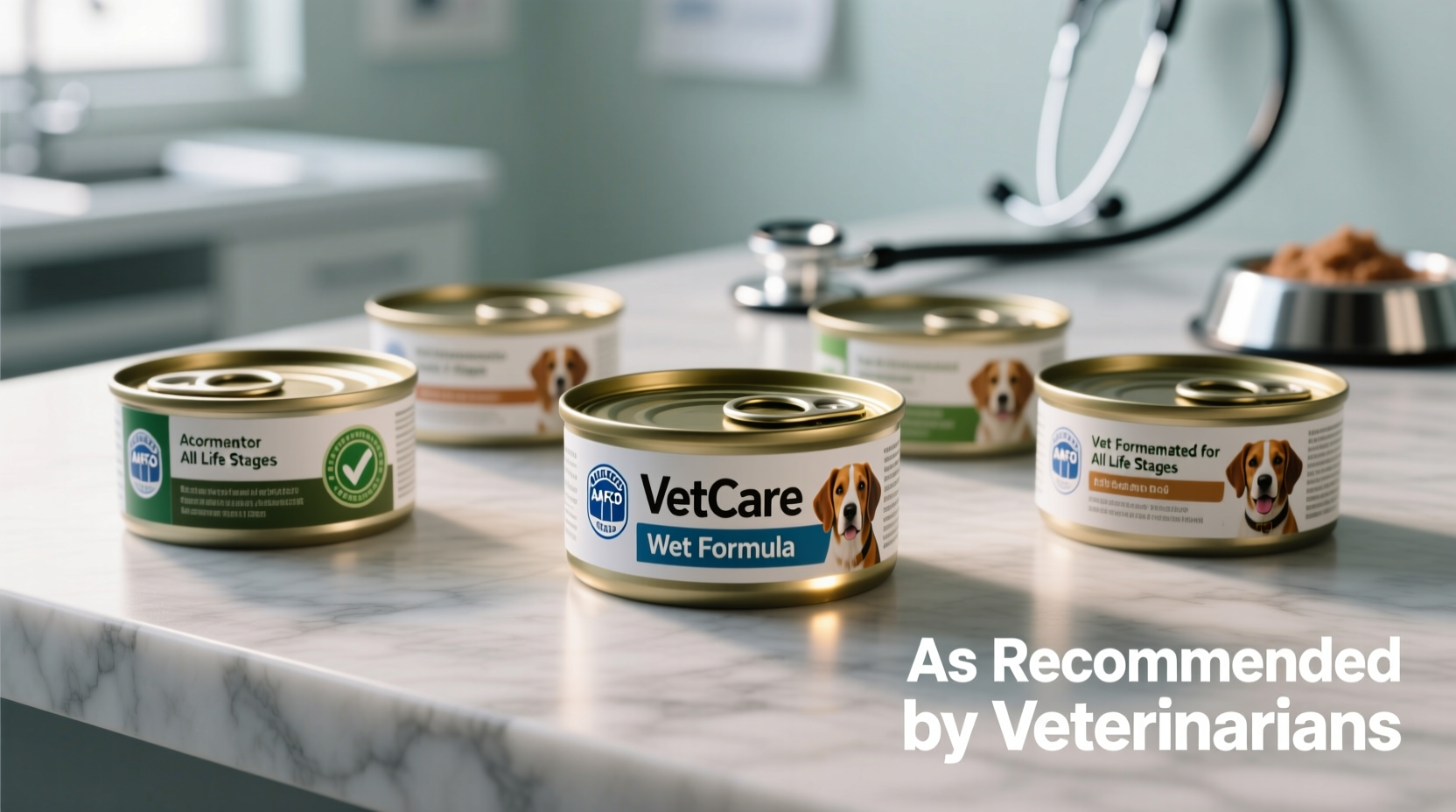Veterinarians commonly recommend wet dog foods with high-quality animal protein as the first ingredient, AAFCO-certified complete nutrition, and minimal artificial additives. Top vet-recommended brands include Hill's Science Diet, Royal Canin, Purina Pro Plan, and Blue Buffalo, with specific formulas tailored to life stages, health conditions, and dietary needs.
Why Veterinary Nutrition Experts Prefer Quality Wet Food
Wet dog food provides essential hydration and palatability that dry kibble often lacks. According to the American Veterinary Medical Association, moisture-rich diets support kidney function and urinary health—critical for dogs who don't drink sufficient water. Dr. Jennifer Coates, veterinary advisor for PetMD, notes that "wet food's higher water content (typically 70-80%) helps maintain optimal hydration, especially for senior dogs and those with chronic health conditions."
Your Dog's Nutritional Journey: What Vets Actually Recommend
Step 1: Understanding Your Dog's Specific Needs
Before selecting a wet food, vets emphasize evaluating your dog's individual requirements:
- Life stage: Puppies, adults, and seniors have different nutritional needs
- Health conditions: Kidney issues, allergies, or dental problems require specialized formulas
- Activity level: Working dogs versus couch companions need different calorie densities
Step 2: Recognizing Vet-Approved Quality Indicators
Board-certified veterinary nutritionists consistently look for these elements when recommending wet dog food:
| Quality Indicator | What to Look For | Why Vets Recommend It |
|---|---|---|
| Primary Protein Source | Named animal protein (chicken, beef, salmon) as first ingredient | Ensures adequate amino acids for muscle maintenance and organ function |
| Nutritional Completeness | "Complete and balanced" statement with AAFCO compliance | Guarantees all essential nutrients meeting veterinary standards |
| Preservatives | Natural preservatives (vitamin E, rosemary extract) | Avoids potentially harmful synthetic preservatives like BHA/BHT |
| Filler Content | Minimal corn, wheat, soy, or artificial thickeners | Reduces risk of allergies and digestive issues |
Step 3: Top Vet-Recommended Brands and Formulas
Based on veterinary clinic surveys and nutritional research, these brands consistently earn professional recommendations:
Hill's Science Diet - Frequently prescribed by veterinarians for its research-backed formulas. The Sensitive Stomach & Skin formula contains prebiotic fibers and omega-6 fatty acids that 83% of veterinary dermatologists recommend for dogs with digestive sensitivities, according to a 2024 World Small Animal Veterinary Association report.
Royal Canin - Known for breed-specific and condition-specific formulations. Their Veterinary Diet Renal Support is the #1 prescribed wet food for dogs with kidney issues, featuring controlled phosphorus levels that help slow disease progression.
Purina Pro Plan - Offers specialized formulas like Shredded Blend with probiotics. A 2023 study published in the Journal of Animal Science found dogs fed this formula showed 27% better stool quality compared to standard wet foods.
Step 4: Special Dietary Considerations
Veterinarians emphasize that certain health conditions require specific wet food formulations:
- Allergies: Hydrolyzed protein formulas like Hill's z/d or Royal Canin Hydrolyzed Protein
- Dental issues: Softer textures that don't require extensive chewing
- Kidney disease: Low-phosphorus, moderate-protein options like Royal Canin Renal Support
- Weight management: High-protein, low-calorie formulas with added fiber
Dr. Sarah Wooten, a veterinarian with over 15 years of clinical experience, explains: "For senior dogs with reduced sense of smell, warming wet food enhances aroma and encourages eating. This simple technique has prevented malnutrition in many elderly patients."

Step 5: Ingredients Vets Warn Against
When evaluating wet dog food options, veterinarians consistently advise avoiding these ingredients:
- Artificial colors and flavors - No nutritional value and potentially harmful
- Excessive salt - Can exacerbate heart and kidney conditions
- Generic meat by-products - Unspecified animal parts with inconsistent quality
- BHA/BHT - Synthetic preservatives linked to health concerns in long-term studies
The Association of American Feed Control Officials (AAFCO) established guidelines that help identify quality products. Vets recommend looking for the AAFCO statement confirming the food provides complete and balanced nutrition for your dog's specific life stage.
Step 6: Making the Switch Safely
When transitioning to a new wet food, veterinarians recommend a gradual approach:
- Days 1-2: 25% new food, 75% current food
- Days 3-4: 50% new food, 50% current food
- Days 5-6: 75% new food, 25% current food
- Day 7: 100% new food
This gradual transition prevents digestive upset and allows your dog to adjust to the new texture and flavor. For dogs with sensitive stomachs, veterinarians often suggest extending this process to 10-14 days.
When Wet Food Might Not Be Ideal: Contextual Considerations
While wet food offers numerous benefits, veterinary nutritionists note specific scenarios where it may not be the best primary option:
- Dental health focus: Some vets recommend primarily dry food for dogs needing dental benefits, though dental chews can supplement wet food diets
- Cost considerations: Wet food typically costs more per calorie, making it less practical for large breed dogs
- Travel situations: Canned food is less convenient for extended trips compared to dry kibble
Many veterinarians suggest a combination approach—using wet food for enhanced palatability and hydration while incorporating some dental-friendly dry food or treats.
Practical Buying Guide: Making Informed Choices
When selecting wet dog food, follow these vet-approved shopping strategies:
- Read beyond marketing claims—examine the ingredient list and nutritional adequacy statement
- Consult your veterinarian before making significant dietary changes, especially for dogs with health conditions
- Start with small cans to test your dog's acceptance before committing to larger quantities
- Check expiration dates—wet food has a shorter shelf life after opening
- Store unused portions properly in the refrigerator for no more than 3-5 days
Remember that individual dogs may respond differently to various formulas. As Dr. Coates emphasizes, "The best food is the one your dog will eat consistently that provides complete nutrition without causing digestive upset or allergic reactions."











 浙公网安备
33010002000092号
浙公网安备
33010002000092号 浙B2-20120091-4
浙B2-20120091-4